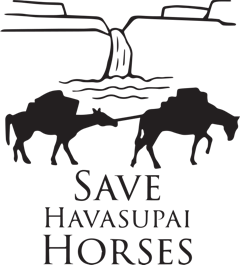SAVE's Position
For decades now, many individuals and organizations have entered the Havasupai Reservation to try to bring about change to help these abused pack animals. Veterinarians, animal welfare groups and church groups have provided vet services, supplies, and sometimes feed. Yet these well-intended efforts have produced no significant change. This is because, unfortunately, these individuals and organizations simply continue to repeat their partial efforts without ever addressing the overwhelming issue of abuse.
Such partial efforts cannot be successful without including the strategies that SAVE endorses. The prevailing philosophy of all these other groups and individuals is to enter the region and provide free help, but to tread lightly so as not offend the Tribe in any way. These misguided do-gooders consistently avoid mentioning, let alone condemning, the abuse. They avoid criticizing anything the Tribe does, or fails to do, regarding their animals' welfare. The idea behind this half-hearted strategy, we now know from witness statements, is the hope or expectation that over time relationships will be built with the Tribe, as will mutual trust. And when that finally happens, they believe, one can begin to educate Tribal members to adopt more humane standards of care.
What's wrong with this approach?
Decades of abuse later, the Supai pack animals are still enduring and eventually succumbing to the same kind of hideous treatment. SAVE agrees that for a long-term solution to succeed, the Tribe must become a willing partner. The issue is how to get the Tribe to the point where they become that willing partner. It is clearly established at this point that continuing to throw good money and goodwill to the Tribe produces nothing in return with regard to the welfare of the pack animals. Only sustained negative publicity will work: exposing the horrors of how these pack animals are treated is what will threaten the Tribal livelihood based on serving the needs of tourists. Negative publicity - and a diminution of the immense amounts of money paid by tourists as Tribal fees - will get their attention. To reiterate, as history has shown, nothing else will.
Therefore, the more the general public is educated about the realities of what is happening on the Supai Reservation, the more evidence and complaints from tourists, and ultimately legal prosecutions, will result. Convincing visitors to the Canyon to practice responsible tourism by not using these pack animals under any circumstances - or, better yet, not to visit the Supai Reservation at all - will tell the Tribe that this abuse is no longer acceptable.
No organization has done for Havasupai pack animals what SAVE is doing. We have created a place, through the internet, that allows tourists to help expose the abuse and the abusers, as well as the entities that profit from the use of the pack animals while completely ignoring their suffering. We ask the public to send us their photos, written eye-witness accounts, and any other evidence they have of abuse. We advise people on how to make formal complaints to the Bureau of Indian Affairs (BIA), and we actively push for federal prosecutions of Havasupai wranglers who abuse their animals. SAVE is always looking for additional ways to bring this problem to the attention of tourists and to anyone who writes about Havasu as a tourist destination. We believe all of these strategies are essential to eliminating the abuse.
Because many of the abused pack animals are used to haul supplies into Supai Village strictly for the benefit of the 500 or so Native Americans who live there - and not for tourists - such abuse can continue even with a diminution of tourism, and be blamed by the Tribe as a consequence of their "poverty."
To really stop the abuse forever, several processes and changes must occur on the Havasupai Reservation among Tribal members who use pack animals.
How can this problem of abuse be ended in the longer term?
SAVE has put together a comprehensive list of changes needed as the minimum requirements to establish the humane care and operation of pack animals in Supai. Note that neglecting any one of these needed changes will result in failure. None are optional.
